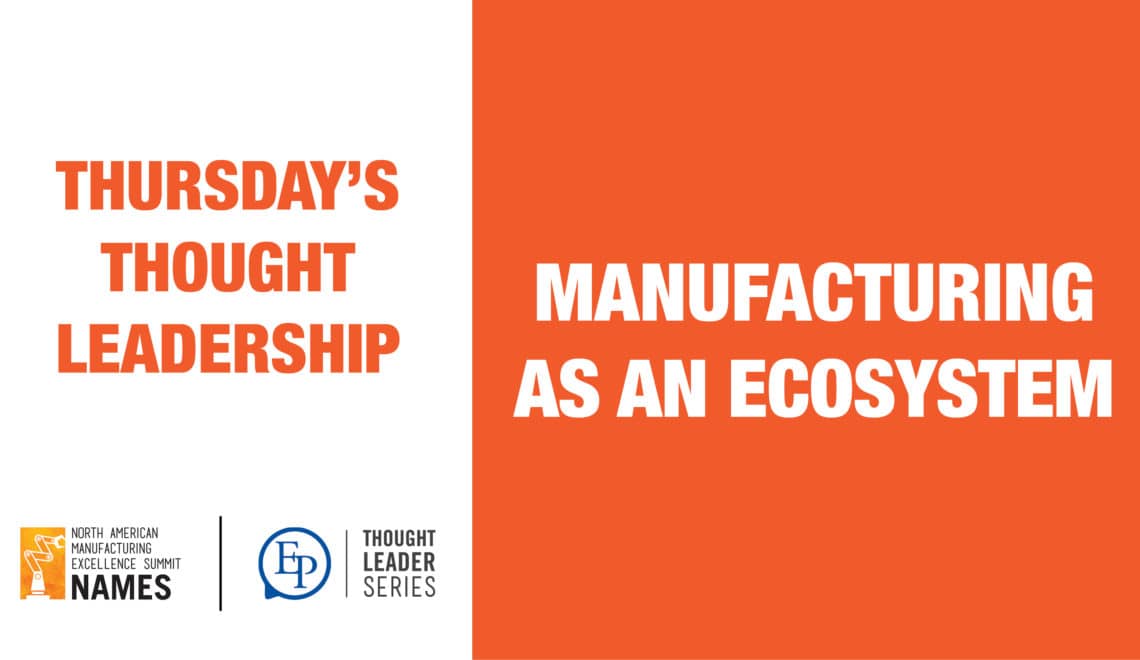
Last month at NAMES21 David Johnson gave a virtual presentation on Nissan Group of North America’s practical approach to transitioning legacy facilities into factories of the future. The whole case study is worth watching, but one of the biggest takeaways is that digital transformation is much more organic than most people suspect. It is not a new technology coming in on top of an existing system and suddenly altering its behavior exactly according to plan. The reality is much more like an ecosystem reacting to change. Systems that were already functioning and communicating and balancing with one another respond and adapt to the new stimuli. Opportunities to grow are seized upon. Weak performers and bad ideas are squeezed out. The system looks for a new balance, a new harmony, and the people responsible for that system get better results if they base their course corrections on an understanding of that quest for the ecosystem to restabilize itself.
Can how manufacturers do business be equated to ecological patterns? How should business leaders think about their operations through the lens of an existing ecosystem responding to change as they plan their own digital transformation journeys?
Here are a few questions to ask about your business:
- Even without digital tools, your manufacturing processes interact with each other in a give and take of people, processes, and products.
- As you upgrade your operations towards advanced manufacturing, are you monitoring how the existing interactions are disrupted?
- Do you have a clear plan for how they should behave after the digital transformation?
- How will you go looking for lessons learned when things do not unfold exactly as predicted?
- Ecosystems are interconnected, interdependent, and interactional. They evolve through disruption. When you bring in IIoT tools and Big Data analysis to understand and improve your processes are you…
- Willing to embrace an “organic mindset” the supports and nurtures adaptation and exploration to find solutions as ecosystems grow and fuse together rather than forcing pre-planned projects onto existing processes step by step
- Taking input and ideas from all facets of your interconnected, interdependent, interactional business?
- Monitoring successes and failures not as ‘good’ and ‘bad’ but as new information for further evolution of the larger plan?
- Sharing the data you harvest from earlier disruptions to inform and prepare future disruptions?
—
Geoff Micks
Head of Content & Research
Executive Platforms
Geoff joined the industry events business as a conference producer in 2010 after four years working in print media. He has researched, planned, organized, run, and contributed to more than a hundred events across North America and Europe for senior leaders, with special emphasis on the energy, mining, manufacturing, maintenance, supply chain, human resources, pharmaceutical, food and beverage, finance, and sustainability sectors. As part of his role as Head of Content & Research, Geoff hosts Executive Platforms’ bluEPrint Podcast series as well as a blog focusing on issues relevant to Executive Platforms’ network of business leaders.
Geoff is the author of five works of historical fiction: Inca, Zulu, Beginning, Middle, and End. The New York Times and National Public Radio have interviewed him about his writing, and he wrote and narrated an animated short for Vice Media that appeared on HBO. He has a BA Honours with High Distinction from the University of Toronto specializing Journalism with a Double Minor in History and Classical Studies, as well as Diploma in Journalism from Centennial College.













